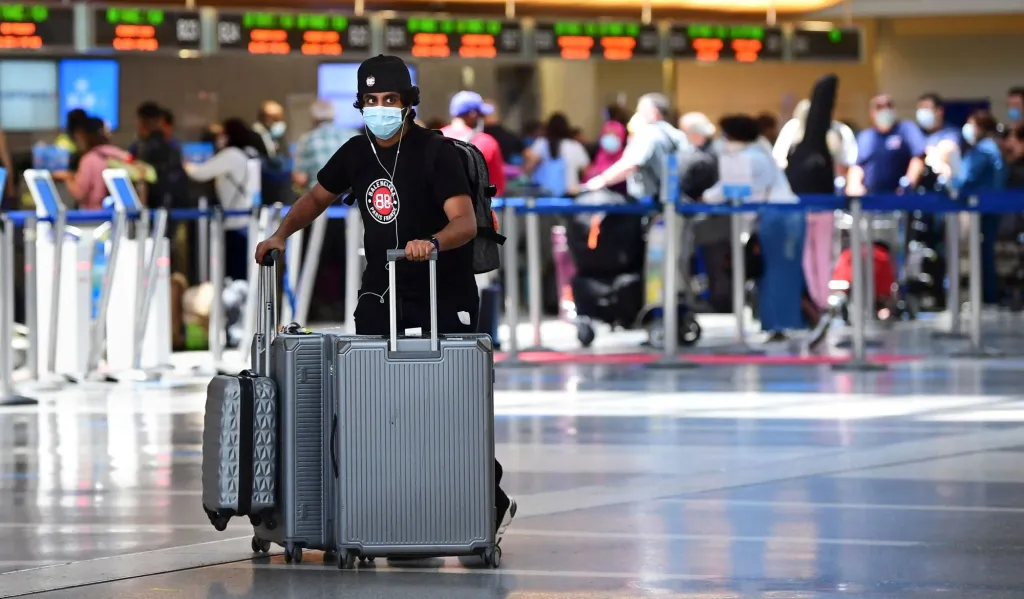COVID-19, Flu, And RSV Impacting Holiday Travel
As the holiday season approaches, the desire to travel and reunite with loved ones intensifies. However, amid the festive spirit, there's a concerning landscape of respiratory illnesses across the United States as COVID-19, flu, and RSV impacting holiday travel.
Author:Jane RestureDec 26, 20231.1K Shares142K Views

As the holiday season approaches, the desire to traveland reunite with loved ones intensifies. However, amid the festive spirit, there's a concerning landscape of respiratory illnesses across the United States as COVID-19, flu, and RSV impacting holiday travel.
Recent federal health data indicates that 17 states are grappling with "high" or "very high" levels of respiratory illness activity, setting the stage for a challenging season.
The states experiencing the highest levels of illness activity are geographically dispersed but concentrated in the Southeastern regions.
Notably, Western states like California, Nevada, and Colorado, along with New Jersey and New York City, are also reporting elevated levels. To assess the respiratory activity in your travel destination, the Centers for Disease Control and Prevention (CDC) offers a respiratory illness dashboard.
Vaccination Gaps And Emerging Concerns About COVID-19 Variants
This year's holiday travel comes with a backdrop of lower vaccination rates. The KFF COVID-19 Vaccine Monitor reveals that only around 20% of U.S. adults have received the updated COVID-19 vaccine, with a majority being individuals aged 65 and older.
Furthermore, the flu vaccine coverage stands at 40.8%, slightly lower than the previous year. In response to the vaccination gaps, the CDC issued an alert to healthcare providers last week, urging the administration of COVID-19, flu, and RSV vaccines promptly.
Flu is making a substantial resurgence, with up to 5.4 million people in the U.S. estimated to have experienced flu symptoms this fall. The CDC suggests that the flu virus thrives in cold weather, potentially impacting travelers to colder climates.
The new COVID variant, JN.1, a descendant of Omicron, is gaining prominence. CDC tracking indicates that JN.1 is expected to constitute at least half of new infections by the end of December.
Although highly contagious, there is currently no evidence that JN.1 causes more severe disease. The CDC advises that existing COVID-19 tests and treatments remain effective against this variant.
Response From Moderna
Francesca Ceddia, Moderna's Chief Medical Affairs Officer, assures that the updated COVID-19 vaccine, often referred to as boosters, is designed to be specific to current sublineages.
Moderna expresses confidence that the updated vaccine covers existing strains, emphasizing the importance of protection against hospitalizations and deaths, which are on the rise.
The overall scenario in most U.S. regions depicts elevated respiratory illness causing an increase in healthcare-seeking behavior and a rise in emergency room visits. The CDC highlights the coexistence of multiple viruses, making this season particularly challenging.
Monitoring And Cautionary Measures
The CDC encourages individuals to monitor COVID test positivity levels and changes from the prior week in their travel destinations using the COVID-19 data tracker.
Additionally, wastewater surveillance data is utilized to monitor COVID levels, revealing variations across states.
While Respiratory Syncytial Virus (RSV) experienced a peak in November, recent data suggests a nationwide decline. Emergency department visits for RSV are showing a slight decrease, with Southeastern states contributing to the overall decline.
Precautions And Public Health Guidance
Health experts anticipate a surge in illnesses, hospitalizations, and deaths in late December and early January due to holiday gatherings and travel. The CDC emphasizes the need for precautions to avoid unintentionally spreading respiratory viruses.
Doctors emphasize the importance of vaccinations for COVID, flu, and RSV to offer comprehensive protection. Wearing masks in crowded places, practicing frequent hand-washing, and using hand sanitizer are reiterated as simple yet effective measures to reduce the risk of virus spread.
With the overlapping symptoms of respiratory illnesses, the CDC advises consulting healthcare professionals or their website for guidance.
It's crucial not to dismiss symptoms as mere cold or seasonal allergies, as prompt identification can prevent potential harm to oneself and others.
Final Words
As the nation navigates this triple threat of respiratory illnesses during the holiday season, a collective commitment to preventive measures becomes paramount to safeguard public health.

Jane Resture
Author
Since she embarked on her first world trip in 2002, Jane Resture spent the past decades sharing her personal journey and travel tips with people around the world. She has traveled to over 80 countries and territories, where she experienced other cultures, wildlife she had only read about in books, new foods, new people, and new amazing experiences.
Jane believes that travel is for everyone and it helps us learn about ourselves and the world around us. Her goal is to help more people from more backgrounds experience the joy of exploration because she trusts that travel opens the door to the greatest, most unforgettable experiences life can offer and this builds a kinder, more inclusive, more open-minded world.
Latest Articles
Popular Articles
